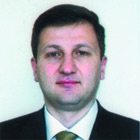Misrepresenting the issues in Nagorno-Karabagh - Vahe Gabrielyan
Alexandros Peterson is wrong: this South Caucases country is a well-functioning democratic entity deserving EU recognition
The article Negotiating a black hole by Alexandros Petersen on Cif on June 7, was regretfully unbecoming for such a reputable newspaper. The author refers to a conflict of which he either has little understanding, or knowingly distorts the truth. He fails to mention how the conflict evolved and grossly misjudges its character.
The Nagorno-Karabakh conflict is not an "ethno-religious conflict" and not one over a disputed territory where "Armenian Christians [are] against Azerbaijani Muslims". It is about the fundamental human rights issue of self-determination, one of being able to peacefully live on the land of your ancestors and be the master of your own destiny. The current situation is a result of decades-long systematic abuse of the human rights and ethnic cleansing of the indigenous Armenian population by the Soviet Azeri authorities since the unlawful annexation of the ancient Armenian province (Artsakh) to Azerbaijan and later, of pogroms and outright military aggression against the peaceful population.
The military phase of the conflict between Azerbaijan and Nagorno-Karabakh ended with the victory of the latter's hastily-formed defence forces and enabled their people to start re-building their lives and homes. Since its independence (impeccably proclaimed according to same laws and procedures by which Azerbaijan gained independence from the USSR), in the political and socio-economic turmoil following the break-up of the Soviet Union and even under military aggression, Nagorno-Karabakh has been a surprising case of rule of law and well-functioning state machine. Starting with the independence referendum in 1991, all manifestations of its people's will, which included four presidential elections and several parliamentary and local ones, have been orderly, dignified and democratic exercises, as witnessed by numerous independent international observers, including, incidentally, members of the UK parliament and the US Congress.
Indeed, Nagorno-Karabakh is not "a governance black hole", but a well-functioning democratic entity with strengthening civil society and full economic and cultural life, possessing all attributes of an independent state, save for international recognition. Its elected authorities have announced on several occasions that they would be happy to receive international inspection missions who can study the situation in situ and refute any groundless allegations. There have been no volunteers to chase ghosts. The allegations of all earthly sins in the mentioned article, happily picked en masse from the Azeri propaganda machine of libellous campaign of hatred and misinformation against Karabakh and enriched by references to all possible evils of our times to scare the modern security-conscious citizen are so bizarre that they are at best ignored or frowned upon in any more or less informed circles.
However, the author is right in saying that the conflict should concern Europe. It should, because although the people of Karabakh have been able to stop the regular bombings of their homes by resorting to self-defence, peace has not been made final yet and threats of war are heard from the other side of the border regularly. It should, because although we keep fingers cross for the renewed negotiations between the presidents and foreign ministers to succeed – the last, June 6 round was constructive and it was decided to continue them – the continuing military rhetoric and the fierce anti-Armenian hate campaign on all levels of society, combined with the mentioned ever-growing military budget, are an ominous sign. It is much worrying that today, fed on this campaign; more than one-third of Azeris are for a military solution while international mediators (the Minsk Group co-chair countries) are widely lambasted for their impartiality. The oil money paid by the European companies should not facilitate the unleashing of another war, the consequences of which will indeed be dire. With a fragile ceasefire being maintained simply because of the balance of power, it is easy to instigate another war that will hugely increase the toll on human life and create new refugees. On top of the already existing one million, about 400,000 of which by the way are the Armenian refugees from Azerbaijan and from Nagorno-Karabakh, this will result in a large-scale humanitarian disaster affecting whole of Europe and beyond. This cannot be allowed to happen. This is why both past and present Armenian authorities have readily engaged in negotiations in good faith and have strived to find lasting peace, despite and because of the fact that one party of the conflict, Azerbaijan, refuses to talk to Nagorno-Karabakh, the other party.
Security in the modern world is certainly a global problem and in order to ensure global peace and security, frozen conflicts should be resolved in a way so that the vital interests of all parties are taken into account. That will take concessions on both sides and it is a hard thing to do. In order to help, the international community, as well as its individual members, should adopt an attitude based on values and principles that apply universally. Acknowledging that the people of NK have the right to be in charge of their own destiny would have helped. It has in other cases. On the other hand, giving in to dirty propaganda and trying to discredit one side, be it with either explicit or implied allegations does not help and raises questions.
~~~~~~~~~~~~~~~~~~~~~~~~~~~~~~~~~~~~~~~~~~~~~~~~~~~~~~~~~~~~~~~~~~~~



No comments:
Post a Comment